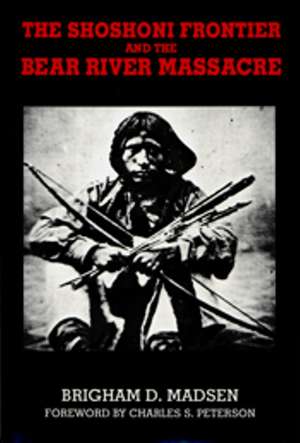Shoshoni Frontier and Bear River Massacre
Autor Brigham Madsenen Limba Engleză Paperback – 10 oct 1985 – vârsta până la 80 ani
In January 1863 over two hundred Shoshoni men, women, and children died on the banks of the Bear River at the hands of volunteer soldiers from California. Bear River was one of the largest Indian massacres in the Trans-Mississippi West, yet the massacre has gone almost unnoticed as it occurred during a time when national attention was focused on the Civil War, and the deaths of the Shoshoni Indians in a remote corner of the West was of only passing interest.
Bear River was the culmination of events from nearly two decades of Indian-white interaction. The Shoshoni homelands encompassed a huge expanse of territory and were traversed by the main paths of western travel, forcing Indian-white encounters. Initially friendly and accommodating to white travelers in the 1840s, by the late 1850s resentment soared among the Indians as they were killed and their food stocks were consumed by emigrants and their livestock. The process of white appropriation of Indian lands reached crisis proportions in the Far West and Great Basin before it did on the Great Plains.
In the historiography of western Indians, few have appreciated the role of tribes inhabiting the regions of along the Oregon and California Trails. Madsen makes a compelling argument that precedents were established that were followed again and again on subsequent western Indian frontiers, offering a new view of early encounters in the Trans-Mississippi West. This detailed narrative of the events and conflicts that culminated in the massacre remains the definitive account of this bloody chapter in United States-Native American relations.
Bear River was the culmination of events from nearly two decades of Indian-white interaction. The Shoshoni homelands encompassed a huge expanse of territory and were traversed by the main paths of western travel, forcing Indian-white encounters. Initially friendly and accommodating to white travelers in the 1840s, by the late 1850s resentment soared among the Indians as they were killed and their food stocks were consumed by emigrants and their livestock. The process of white appropriation of Indian lands reached crisis proportions in the Far West and Great Basin before it did on the Great Plains.
In the historiography of western Indians, few have appreciated the role of tribes inhabiting the regions of along the Oregon and California Trails. Madsen makes a compelling argument that precedents were established that were followed again and again on subsequent western Indian frontiers, offering a new view of early encounters in the Trans-Mississippi West. This detailed narrative of the events and conflicts that culminated in the massacre remains the definitive account of this bloody chapter in United States-Native American relations.
Preț: 138.46 lei
Preț vechi: 174.23 lei
-21% Nou
Puncte Express: 208
Preț estimativ în valută:
26.49€ • 27.74$ • 21.98£
26.49€ • 27.74$ • 21.98£
Carte indisponibilă temporar
Doresc să fiu notificat când acest titlu va fi disponibil:
Se trimite...
Preluare comenzi: 021 569.72.76
Specificații
ISBN-13: 9780874804942
ISBN-10: 0874804949
Pagini: 312
Ilustrații: 16 illus., 4 maps
Dimensiuni: 152 x 229 x 26 mm
Greutate: 0.48 kg
Ediția:Pbk.
Editura: University of Utah Press
Colecția University of Utah Press
ISBN-10: 0874804949
Pagini: 312
Ilustrații: 16 illus., 4 maps
Dimensiuni: 152 x 229 x 26 mm
Greutate: 0.48 kg
Ediția:Pbk.
Editura: University of Utah Press
Colecția University of Utah Press
Recenzii
"A very important book.... Readers will understand better who the Shoshoni were, who they are, and why the conditions of 1840–1865 dealt with them so tragically."—Montana Magazine
"An excellent chronicle of antagonism between the far-flung, loosely affiliated Shoshonis and a cavalcade of western travelers, Mormon settlers, and jumpy soldiers."—American Historical Review
"An excellent study of this neglected frontier and the tragedy that climaxed two decades of ever-increasing friction between the native inhabitants and the newcomers of a little-known part of the West."—The Western Historical Quarterly
"The research is comprehensive and deep and the scholarship excellent."—Robert M. Utley
“A meticulously documented history of Indian-white relations in a previously ignored area. A welcome expansion of detail on the comprehensive work of the late John Unruh in The Plains Across and of immense value to those of us concerned with constructing a full ethnohistory of the Great Basin.”—American Indian Culture and Research Journal
“[A] thoroughly researched study by a prolific scholar. An excellent case study that confirms recent scholarship, and includes an extensive, current bibliography of the Shoshoni.”—CHOICE
“Careful research and excellent scholarship. A major historiographical revision of Utah-Idaho history.”—American Studies
“A significant contribution to our study of the West.”—Deseret News
Notă biografică
Brigham D. Madsen (1914–2010) was professor of history at the University of Utah. He authored eight books, including Glory Hunter: A Biography of Patrick Edward Conner (University of Utah, 1990), and he co-authored, edited, and contributed to numerous other works.
Descriere
A detailed narrative of the events and conflicts that led to the 1863 Bear River massacre of over two hundred Shoshoni men, women, and children at the hands of volunteer soldiers from California.
